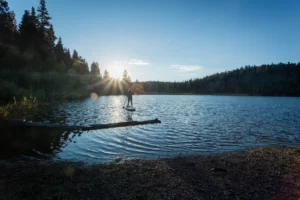
Psilocybin Assisted Therapy, Personal Use, and Evolve Wild Journeys: What’s the Difference?
Discover what a psilocybin retreat is, how it supports healing and mental health, and why Evolve Wild’s nature-based journeys offer a deeper transformation.
Theodore Roszak first coined the term “Ecopsychology” in 1992, in his landmark book “The Voice of the Earth.” While it is a new term for many Westerners, the principles are mainly a modern way of speaking about nearly universal practices local cultures held for millennia prior to recorded history.
Roszak held the concept of ecological unconscious as a main premise of ecopsychology, which is a form of collective unconscious we share with all beings. From this, one’s environmental identity, or connection to a specific aspect of the natural world, is instilled, and one of our main objectives in life is to discover and live into what that is.
Bill Plotkin offered a lifespan development model from an ecopsychology perspective in his book “Nature and the Human Soul” which, for my money, captures the essence of true human growth better than all the other culturally based lifespan development models out there. On this, most in the field don’t use an overarching lifespan development model (ponder that one the next time you have some free time).
Anyway, ecopsychology obviously takes a different approach to human psychology than traditional mental health. The field’s main goal is to deepen your relationship with the natural world and, through that, your natural, authentic self. There, you find your true gift, live into your deeper humanity (being an emotionally healthy, self-aware adult), and alter the world around you to align with that internal awareness.
Many people with a Western, individualistic perspective will unconsciously and outwardly minimize this. I believe that’s likely the biggest reason ecopsychology is the most important field of psychology and human well-being, that most people living in the modern world could work on right now.
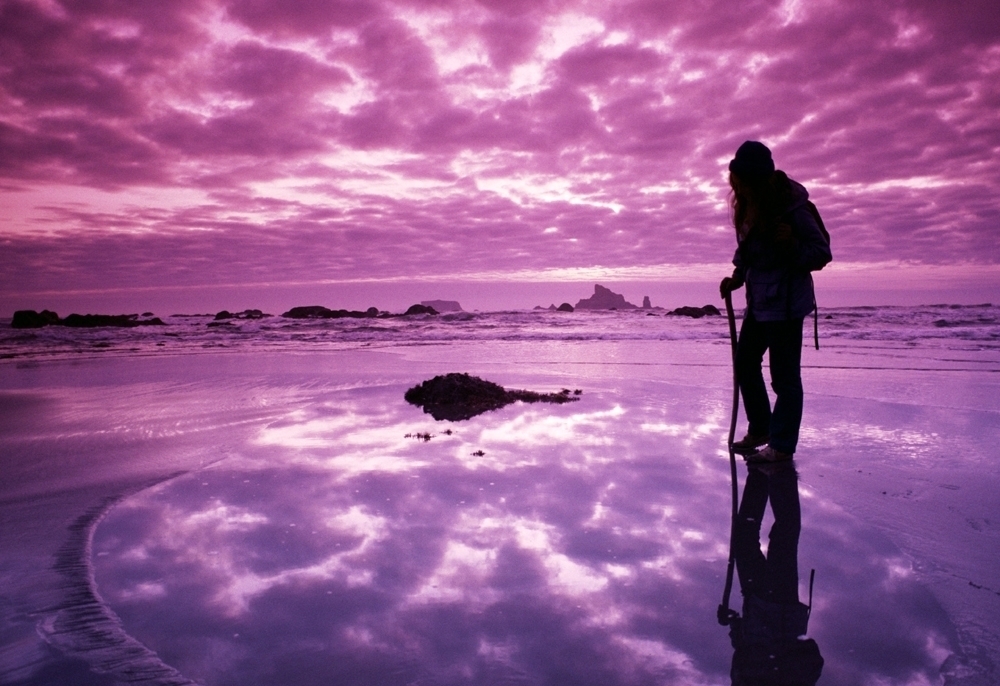
To understand all of this, it helps to bring our modern lives into a bit of context. From the beginning of life on earth through billions of years, we evolved in absolute connection with the wild world. This is the baseline of our evolution, both consciously and physically.
We are complex organisms built, from the most basic form of life up (keep in mind that evolution started way before the first human branched off from the apes), immersed in the natural world. That’s the first few billion years of our evolution.
When people first spread around the globe, they began creating local cultures. Their ceremonies and practices were tied to the creatures and the natural environment in which they lived. Those people didn’t need ecopsychology, as they were still deeply connected to the natural world in which they were still immersed in, and subject to the changing nature of. But humans were about to go down a different path, uncharted by any species that had inhabited the earth before them.
Through technology, culture, language, the ability to use our hands, and our powerful intelligence, people began to alter the land in ever-evolving ways. We also dominated the other creatures who lived on it.
We began to domesticate the wild. In doing so, we ourselves became increasingly domesticated. While there are great advantages to doing this, doing so as our main focus, without regard for the world or beings in it, started to bring us out of alignment with it all.
As some cultures gained more land and expanded their population, they persuaded, coerced, and otherwise forced other people to contribute to their way of life, or die with their own. More people became increasingly disconnected from the natural environment as their focus shifted more to the human-created world for personal and cultural survival. They also internalized this view of the world, believing that the human one was more important than the natural one. In many ways, it was becoming just that.

Through technological advances, our capabilities grew exponentially. We now live nearly twice as long as we used to. We could grow more food and need less space to roam, and are less subject to natural events. We now have the capability to create just about anything we want and need. Ironically, this is leading us further from what is truly fulfilling.
We have increasingly disconnected ourselves from the natural world and the wild nature within ourselves. As the human-nature relationship grows more strained, nature is responding. We are causing an ecological crisis marked by ever-increasing natural disasters, global climate change, and a host of coinciding environmental problems. With these environmental issues come chronic disease and human health issues of ever transforming ways.
We were always destined to get to this point, in my opinion. There are a host of short-term advantages that come with living this way that one culture was bound to capitalize on. But it’s ultimately unsustainable, and we’re now understanding the implications of this.
As a species, we stumbled to this point, unaware of the consequences of our powers. We’re growing increasingly aware that it’s all catching up to us now.
While climate change, for example, weighs heavily on our collective anxiety, most people alive today don’t see our connection to the natural environment as much of an issue. But people’s perceptions of themselves, culture, and nature are the biggest barriers to truly engaging in a new way to our current environmental crisis. Restoring our emotional connection with the natural environment and the more-than-human world is the most powerful thing we can do to face our current ecological crisis.
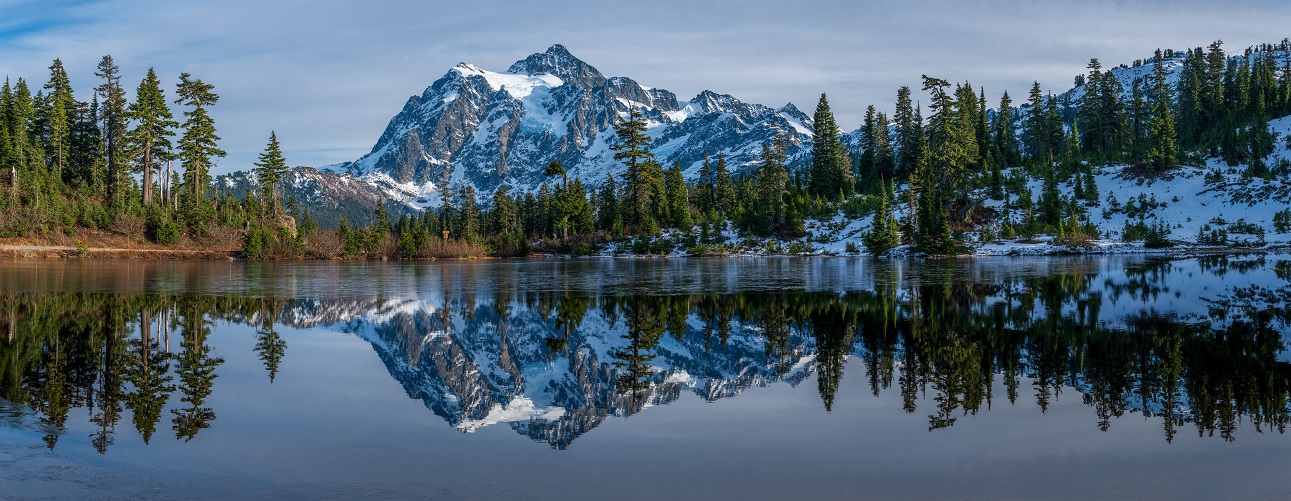
Our emotional responses to seeing plants, animals, landscapes, and people affected by human-created impacts on our environment should be empathy and a desire to help. We are naturally empathic beings.
Shoving that aside for self-serving justifications is an immature, albeit easier, response to the myriad of crises we face. While we have the choice to ignore that part of ourselves, doing so disconnects us from a more complex, loving presence both with ourselves and with the more-than-human world.
If we put our energy into it, we could change everything overnight. We would have to do it as a global culture for it to work right, but it could happen. We just have to recognize the value of our deeper emotions more fully.
Everyone alive wants to live a peaceful, meaningful life. We all want to be good to the natural world and each other. We often just don’t know how to do that. Worse, our global, egocentric (the opposite of ecocentric) culture and the values it instills in people works against these ends personally and societally.
We now need, more than anything, to restore our physical and emotional connection with nature both within ourselves and in the world around us. That’s the core work of Ecopsychology.
When it comes down to it, we all want to love others and the world around us and to be loved in return. Everyone wants to live a happy, meaningful, fulfilling life where their thoughts, words, and work matter. These are universal human desires, no matter who you are. If we developed according to our deeper human nature, that would be the aim of life. The absence of even the awareness of all of this is the root cause of most of our suffering, and our pathological, culturally-based insecurities.
We all have issues with this, and restoring our connection goes a long way for everyone’s well being. Most everyone grows up quite disconnected from the wild, and the gap is increasing exponentially in the generations alive today. Then, as we see the destruction we cause due to our presence on this planet, and we assume people are just destructive by nature. It creates a spiral of anxiety, hatred and a number of other unresolved issues.
Don’t let the name fool you; Ecopsychology isn’t just for those with “mental health issues”. It’s for everyone who grew up in, and instilled the warped values of, our insane, self-destructive culture as their own. There is no healthy attachment to that. We all carry this weight collectively to an extent at this point.
Everyone single person alive today has conflict with our modern global culture, their place in it, and how it affects the more than human world. We typically work to reinforce the culture that uses us for its purposes rather than using our power to create a culture that serves our true human potential.
The key to your human health and our environmental crisis rests in our relationship with the world, our environment and ecosystems, and your deeper human nature. When you love yourself deeply and fully, which happens when you love the world you’re in and all of life, then you can offer that love to other people. You can bring your true sense of self into the culture and change it around you.
This premise lies at the heart of every other issue we face at this time. Allowing yourself to become a force of love is what changes people, society, and, most importantly, you. You grow with it. It’s not arguing and fighting about beliefs. It’s how you live every day, the lives you touch, and how that path unfolds. This has a ripple effect on your interactions with the world and the other people in it.
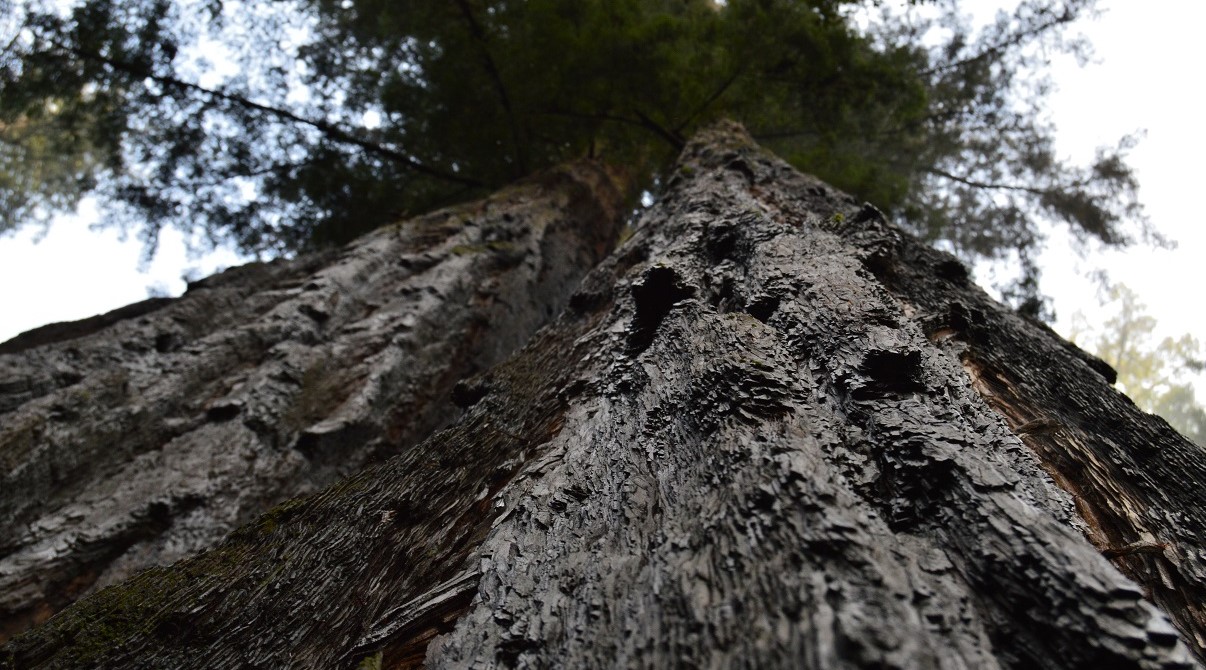
People tend to assume that ecopsychology is simply a branch of mental health. I view it as an entirely different path, though one that modern mental health can aid in. It encompasses far more about becoming fully human than the mental health industry even considers, recognizes the interplay of our well-being and the environmental crisis, and incorporates the relationship between the natural environment and physical health. It also entails a journey that guides us to becoming wiser, more fully emotionally developed, loving beings living life aligned with those values.
I want to recognize that many very talented people are doing ever better work in the mental health field. I am not trying to discredit them or this work. I am in therapy myself, and I think both inner work and clarity around our relationships with other people absolutely have value. It has helped many people hang on during some very challenging times and situations. Plus, there are a TON of unique personal approaches to this work. Not all are directly tied to generalizations I make about the field.
But, there are some significant shortcomings around the focus and direction this field takes to our well-being. It filters through the education, licensing, and into the work of even the most skilled therapists. The academic and governing bodies of the field are headed in a highly questionable direction, at best.
Meanwhile, ecopsychology aims to address ecological issues like environmental crisis and climate change more directly than modern psychology. It helps us to recognize ourselves as a part of nature and the ecosystems we inhabit rather than above it. And it works to align our fates directly, rather than trying to placate us through these difficulties. And it can’t be co-opted by the pharmaceutical companies or have its value easily undercut by corporate greed, though I’m aware it’s not immune from either of those issues. At this time, it’s mainly in direct opposition to that.
To understand this, let’s compare the two.
From the traditional mental health perspective, the client’s mental health issues are what causes the person to seek help. Whether a trauma, mental disorder, addiction, depression, biological factors, or beliefs, something keeps the person from living the life they desire. The object, then, is to help the person overcome their mental illness, or something like that.
That’s the essence of the Diagnostic and Statistical Manual of Mental Health(DSM-V), the de-facto bible of the mental health world. This is what most healthcare providers in the field work from. That’s mainly how the larger culture views mental health and psychology. People use “diagnoses” to label themselves or others, and then heal or fix themselves according to those issues.
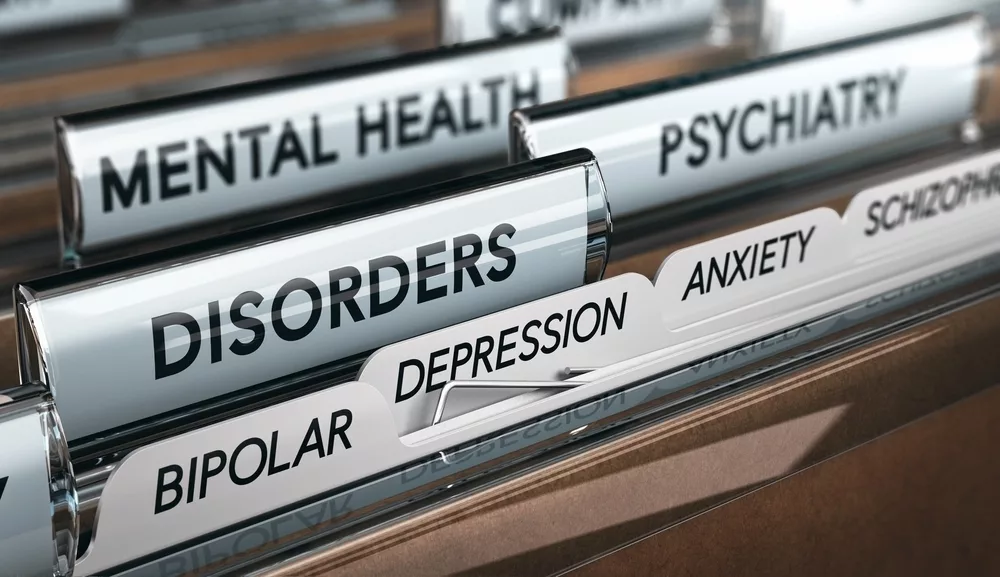
From an ecopsychology perspective, our issues start with the awareness that our human-created world is imbalanced, unjust, and unsustainable. We can’t have a healthy attachment to that world, as it doesn’t align with the core values of an emotionally healthy human being.
As we learn to live and function in this world, our true nature gets in the way of fitting into it. So we suppress ourselves, which creates a host of “mental health issues” in favor of socially and culturally acceptable persona. To do this, we often shame, ignore, and generally hate on aspects of ourselves that don’t align with it.
We all suffer from these cultural mental health conditions. The more extreme cases, those whom society outright rejects, create the conditions for severe mental illnesses. This is when people who struggle to adjust absolutely break from this harsh reality.
From a larger perspective, the world us people have created uses what it can from us and discards the rest as though it holds no value. This is true not only for humans, but also for plants, animals, and even entire ecosystems. To adjust to this world, we have to suppress part of our true, unique, loving, caring selves. In other words, we sacrifice parts of our wild nature.
In traditional mental health, someone seeking mental health services either goes to a therapist’s office (or, nowadays, online), to a group, or a more encompassing facility, like a home, center, or hospital. They are essentially the experts, while you are the client. The therapist or team will talk with the client about ways to cope with their disorder/trauma, or they will administer drugs.
We all need people to hear our stories and the stuff we normally keep locked inside. Those people need to be empathic and not directly involved in our lives. Kids and adolescents especially need honest interaction, particularly with healthy adults. It’s also very healing for those who have difficulty with trusting people. But talk therapy alone only goes so far.
Then there are the drugs. These are typically created by the pharmaceutical industry for its own gain. It can be helpful initially, but I strongly disagree with them being given for life as the permanent solution to issues that they are essentially making up. While they can initially create balance in an area of imbalance, relying on them will ultimately create imbalances in other areas (often listed as “side effects”).
The DSM-V aligns more with the psychopharmaceutical industry by the edition. As a result, people across the country and world numb themselves for life and never work on the real issues they need to face.
This is not a great path to sustainable, lifelong change, not to mention personal or cultural evolution.
A quality ecopsychology approach will help you move through a journey where you reconnect with wild nature, both within yourself and the world around you.
Obviously, this journey best takes place in a natural setting. But the journey within and the openness to a different, freer experience of consciousness is part of it as well.
During the most potent moments, you experience a feeling of presence and peace punctuated by moments of awe as you relish in the beauty of the living world you are immersed in. You realize those moments are the ones you’re searching for in everyday life.
When you enter this state, you clear out all the stuff the everyday world presses on you. You see yourself and your life differently. And the real struggle you are facing emerges.
I see my role in this journey not as an expert, especially about you and what you need, but as a facilitator and guide. My priority is to keep you healthy and physically safe and offer you ways to move through yourself and the world differently. You choose what speaks to you, what comes to you in the moment.
Meanwhile, the world around you offers itself to you in its own way. The real lessons, insights, and wisdom come from it, and what you find there.

In traditional mental health, the struggle involves overcoming the client’s presenting mental health issue(s) or barriers these issues create. The client and therapist attempt to correct, cope with, or work around these issues altogether. This is more and more just turning people to drugs, either prescription or self-administered, to do the work for them.
Others earnestly try to do inner work. Some practices can help, but they will only get you so far. Very few mental health services offer much understanding of one’s environment, particularly regarding human-made vs. natural ones, affects the process.
People often abandon their mental health care, frustrated and disappointed, without real, sustainable, meaningful change.
In ecopsychology, you develop a stronger connection with your inner wild nature as you spend time on wild lands. You naturally explore what speaks to you deeper when you are connected in this way. You see life more clearly, far beyond what you have been taught. You recognize what isn’t serving you. And you connect with the real you and a world that loves and supports you fully, just as you are.
It’s not all happy times. Through your journey, you will ultimately have to face something in yourself. But it isn’t actually about vanquishing or conquering much of anything. It’s about loving and accepting the truth of who you are, obscured by the lessons and values of the world in which we have come to know. This transforms your struggle from a source of conflict and pain to a source of strength. This is the concept of the sacred wound, which each of us carries.
Through traditional therapy, the hope is that you can be reinserted back into some version of your previous life more comfortably. This time, you’re armed with some new tricks, ideas, or drugs to help you handle stress. Maybe you have to face some hard truths about your life, relationships, or even your job. It’s often letting go of some things, but without a great sense of where to go next, or a sense of deep fulfillment or peace. Your relationship with the larger world you know is essentially unchanged, though you may develop less anxiety about living in it.
Your worldview will likely remain similar to when you started the process. It’s essentially the same you, but you understand your strengths, warts, and abilities differently. This ultimately helps both you and the human-made world function differently while we’re all still headed in the same direction. The client and those close to them can hopefully see “real world” improvement and consider this success as long as it lasts.
I won’t lie, the biggest issue with a shift after a powerful experience in the natural world is that it’s just the start of the process, and it can be nearly as difficult as life before. The culture won’t support your shift, and the people you are closest to won’t understand what happened to you. This can make the next phase of your life a struggle.
After a deep nature-based experience, people can become more detached from their previous lives in many ways. They take steps to live more aligned with their wild nature and bring their true purpose into their lives, or they knowingly sink back into acceptance of a life that doesn’t align with them. Letting go of what truly doesn’t serve you can be a long, challenging process.
The people close to you often won’t understand what you went through either. Worse, you’ll come back into a world that, though it desperately needs this version of you, will not know what to make of you and will likely reject you. This can be a trying time. But, transitioning your life to align with the most authentic version of yourself is a difficult process.
This may sound worse than doing nothing. But there are some massive benefits. One, you begin to spend more time outside urban areas and in nature. You also have times when you deeply love and honor your true self to your core. This opens you up to living the fullest version of your life.
On the surface, seeking out traditional mental health avenues seems easier, maybe even better. But it has a price, as it doesn’t do much to face and improve the situation. We’re at quite possibly the most crucial time in the history of our species, and perhaps even the entire planet, and things aren’t looking great. If this change were easy, we would have done it already.
This path ultimately creates a new way of being in the world, not only for yourself but for others who need the gift you carry, that wild nature put you on this earth for. And you make it easier for others to go through their journey.
We are living in an insane, self-destructive age. Mental health problems are part of a much larger issue. Those who numb themselves to it, change themselves to align with it, or even rage against it with all their being only contribute to it. The truth is, most people don’t know how to deal with mental health any other way.
The best thing we can do is go through a journey of personal and cultural change. Those who do live a more authentic, aligned way of life. They are the ones that will create the conditions for a more aligned way of life and make the transition to the next stage in our evolution.
Most people alive today ignore, to the point of outright denying, the importance of our connection with wild nature. Creating space to reconnect with it intentionally is rare and almost absent from the world of modern psychology. But it opens the door to everything else.
If there’s one thing you can do to that end, it’s come out on an experience. If you’re not ready for that yet or want to make sure it’s right for you, schedule some time to talk with me. Or read more about this stuff. That’s why I wrote it anyway!
I can also introduce you to friends and colleagues if there’s a better fit for you. There are people who do a variety of different work in this field.
However you move forward, it’s up to you. But if the words here resonate, you’re at least on the right path by reading this. I, for one, hope you continue on it!

Discover what a psilocybin retreat is, how it supports healing and mental health, and why Evolve Wild’s nature-based journeys offer a deeper transformation.
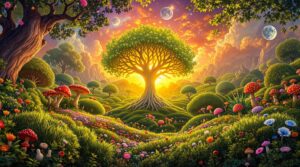
Discover what a psilocybin retreat is, how it supports healing and mental health, and why Evolve Wild’s nature-based journeys offer a deeper transformation.

Whether you chose to spend your time on a Nature Based Journey or one of the many retreats, you should know the difference. Here are 5.

Through my journey in psychology and mental health, I realized what most people miss regarding mental health, despite it being so obvious!

Discover what a psilocybin retreat is, how it supports healing and mental health, and why Evolve Wild’s nature-based journeys offer a deeper transformation.

Discover what a psilocybin retreat is, how it supports healing and mental health, and why Evolve Wild’s nature-based journeys offer a deeper transformation.

Whether you chose to spend your time on a Nature Based Journey or one of the many retreats, you should know the difference. Here are 5.

Through my journey in psychology and mental health, I realized what most people miss regarding mental health, despite it being so obvious!